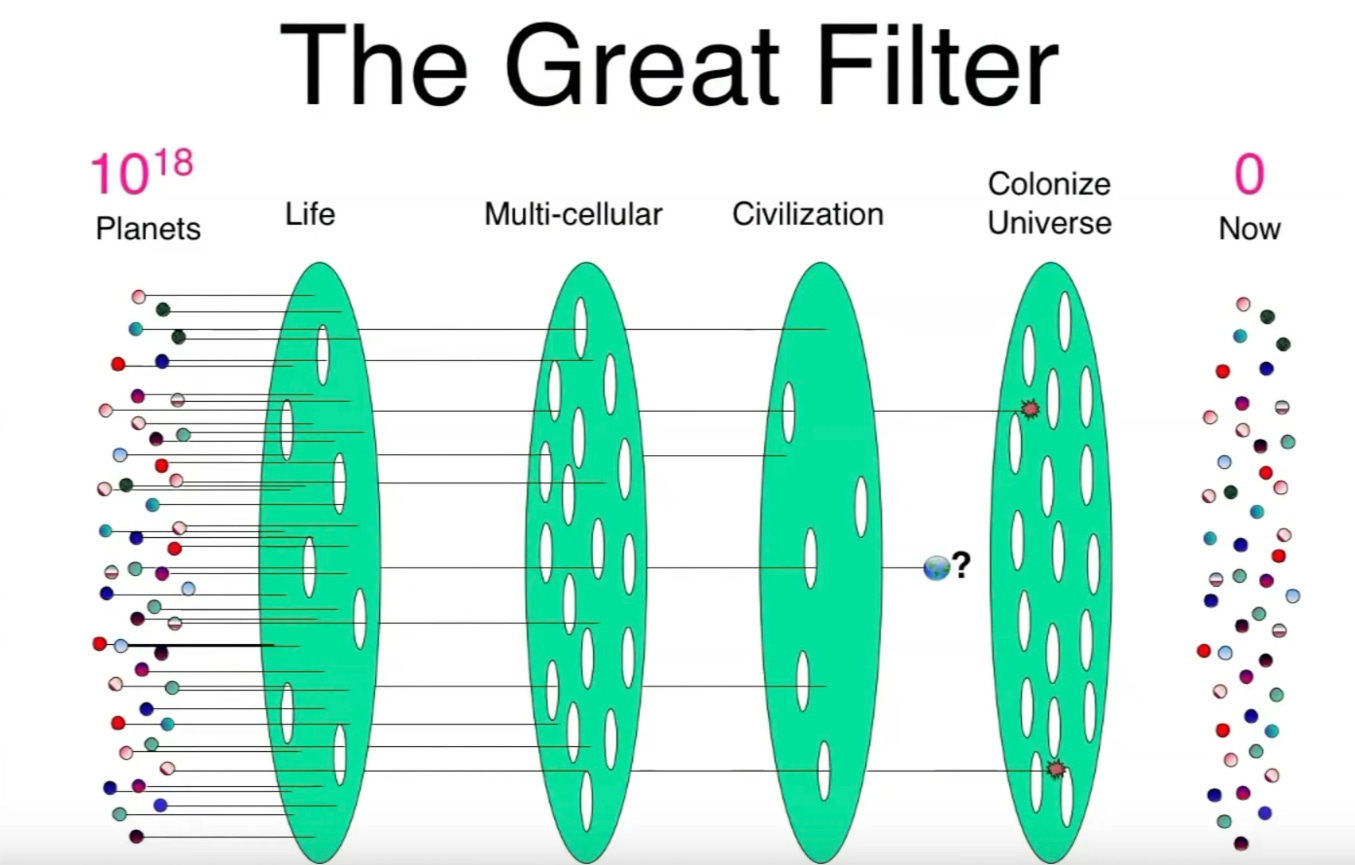Why I'm Stupid and Arrogant if I Don't Believe in Aliens
~6-9 minute read. There's a twist at the end
Do you believe in Aliens?
Sit down and think about it for a second.1
The Argument from Infinity
Considering the size of the Universe, you should believe in them.
If the Universe is infinite, Aliens must exist.
It follows from the Monkey at the Typewriter thought experiment: if a Monkey were to type random characters for infinity, eventually, due to the nature of infinity, he would type out the complete works of William Shakespeare in chronological order.
The idea is that in infinity, every permutation of everything exists because it’s infinite.2

So given the nature of infinity itself, which we think the Universe might physically be… doesn’t it seem like Aliens have to exist? If infinity is really infinite, everything must exist within it’s infinite possible-ness.
It seems logical and intelligent to believe in Aliens on the basis of infinity.
The Argument from Humility
Let’s take a different approach.
Do you really think human beings are that special?
Do you really think that we alone in the Universe? That we alone hold so prime a position? That the great cosmic accident of consciousness really only happened to us?
Isn’t that incredibly arrogant to think that out a 93 billion light year wide universe, we are alone and therefore special? Infinity aside, could we really be so self-centered as to make ourselves the center of the observable universe?
It seems actually to be virtuous and humble to believe in Aliens.
The Great Filter
Maybe you wonder “Logic and humility aside, why haven't we seen any aliens?”
Great question, it’s one a man, Enrico Fermi (Italian physicist who worked on the Manhattan Project) also asked: “Where is everybody?”
Given all the possibility for life in the Universe, surely we should have seen signs of intelligent life out there. But we haven’t. What gives?
It’s known as the Fermi Paradox.
One answer to the Fermi Paradox is known as The Great Filter.
The theory states that there are a number of evolutionary leaps an organism needs to make in order to reach Interstellar travel. In order to travel the Universe and say hi to humans an organism needs to first be alive which is easier said than done from an evolutionary standpoint. Then it needs to be able to actually become an entity of some kind (bacteria don’t tend to travel the Universe in space ships.) It needs to have sentience and language (something only humans on our planet have managed, somehow, to do) and create civilization (again, only humans) and manage to not have that civilization tear itself apart (jury’s still out) and then finally be capable of Interstellar travel, which is pretty tough.
The Great Filter posits there is a great evolutionary filter that keeps most organisms from reaching the point of space travel. It could be the life-barrier: it’s hard for primordial soup to start swimming. It could be language. It could be civilization are popping up all over the Universe, but can’t quite figure out space travel.
We don’t know what the Filter is that’s preventing everyone from stopping by to let us know they are there. That’s kind of scary because the Filter applies to us: are we special? Or have we not hit it yet?
Some people posit the idea that Nuclear Power is the Filter: can you wield it without total planetary destruction? It seems no one out there has managed to wield great power with great responsibility, which is why we haven’t been visited yet.
But even if the Great Filter is real (it’s just a theory)… there’d still be aliens out there, they just wouldn’t be visiting us.
So lack of seeing doesn’t mean lack of existence, just that something might be hiding us from seeing what’s there.
Summary
So we’re back to the argument for the Existence of Aliens on three points:
The argument from Infinity:
Infinity holds every possibility.
Aliens are a possibility.
Infinity demands Aliens exists.
The argument from Humility.
It’s self-centered and arrogant to assume we’re alone in the Universe.
It’s humble to recognize that we do not hold a position of prestige just because we’re alone.
The counterpoint of lack of evidence doesn’t hold.
Just because we don’t see Aliens doesn’t mean they don’t exist. You can’t scientifically prove a negative.
Time to Come Clean
This essay isn’t trying to convince you that Aliens are real.
It’s trying to point out that the means by which many intelligent and humble people believe in Aliens actually works as an argument for the existence of God.
Infinity
Considering how seldom we interact with something infinite, it is interesting to see humans’ reactions when we do. Aliens, for example, are believed in not because of evidence but because of faith: faith in infinity. The only infinity we encounter solidly and concretely (that is, in a material way) and in a scientific manner (that is, in an empirical manner) is the Universe itself. Therefore, Aliens must exist because of how big the Universe is. It is considered foolish to believe otherwise, on account of the infinite possibilities.
The same courtesy we give to aliens we do not give to the Creator of aliens. In the infinity of the universe, we cannot conceive of Infinity Himself.
To believe in aliens on the principle of infinite variables is not a scientific proof: it is a philosophical proof. The scientist is ever under the patronage of St. Thomas Didymus, who required the empirical touch of his hand to believe. The philosopher is ever blessed by Christ who gives that blessing to those who believe without seeing.
Humility
The second reason we may be compelled to believe in aliens is a certain humility and disdain of pride. In the humility of humans to announce we are not the center of the universe we cannot find humility enough to say who is, properly, the Center of everything.
Humans as the center of the universe? What pride those medieval Christians had.

Except pre-heliocentric thinkers didn’t believe that the Earth held a privileged position at the center of the universe. It believed the world held the lowest position. The only unmoving, silent position in a Universe where perfection and love were indicated by speed and music (the music of the spheres.)
Man has never been more humble about his place in the universe than than in the conception of the geocentric universe.
We deem it good to believe in alien existence because to believe that humans are the only life form is arrogant. Scientific method? No. Virtue is the testament to extraterrestrials.
How do you argue with humility? You argue with it by understanding that the deficiency of a thing is just as much a vice as an excess (Aristotle.) Medieval humanity thought man too important, possibly, but modern man definitely thinks of man too little. If there is a modern center of the universe, science tells us it is empty: a geological coincidence (which is philosophical belief, not a scientific one.) But to discount the phenomenon of life at all is to essentially declare extraterrestrial life unimportant: if we, as sentient, conscious creatures are so unimportant in the face of the vast cosmos, why does it matter to find a being like us? Scientific humility is not humility: only disdain for religious humility.
Let us also recalled that long before it became logical and humble to believe in Aliens, religious people believed that humans were not alone in the Universe: they believed there were other creatures out there, like Angels and Demons; or Genies; or gods, nymphs, fairies, elves and more; or God. The very perspective, when religious, that is seen as backwards, pre-scientific, and superstitious is given a place of privilege when applied to and outer space we just haven’t seen yet.
There are better questions about aliens
When we rely on the argument from Infinity or the argument from humility, we miss out on the really interesting question of alien life.
What does it mean if we really are the only sentient life form?
If other life forms exist, are they like us?
Are aliens sinners? If so, why?
What does it mean for religion if there is alien life?
What did aliens evolve from?
Are they carbon-based?
How do they communicate?
What is their grammar and what does that suggest about their perception of objects, time, gender, possession and an infinity of other things?
We forget that alien life, if it exists, will be entirely “other.” No humanoid entities for us, probably (and what implications if they are humanoid!) But why would we think that our consciousness and interpretation of reality would be the only kind? How do we think that communication would even be possible?
As a result, I find the existence of alien life interesting, to be certain; but beyond the question of existence, I find the consequences of that existence to be far more interesting.
Time to come clean-er
So I don’t really expect this essay to convince anyone that God exists.3
If you want to persuade people to believe in something that they can’t see, aliens doesn’t strike me as the most efficient means by which you can convince someone of something else.
But the truth is, that’s not entirely what my essay is about. Content-wise everything looks like it is about aliens and God, but in reality I like the essays to be thematically about something different than the actual content discussed (like how this essay isn’t actually about pizza, but about how individual entities are treated as avatars of larger ideologies; or how my favorite essay, which spans a wide variety of topics, is just a review of a dictionary.)
This essay has really been just trying to prove that the gap between religion and science isn’t as wide as we’d like to make it seem in our society.4
It’s not just the actual practice of either (because those cover different domains of life (the correlation of naturally occurring phenomenon and the metaphysics of everything) but the perspectives we hold when interacting with the unknown and spectacular.
In a post-christian society Science has become a religion in its own right, and therefore is going to look a lot like Christianity in the way some people think about it. The same faith, humility, virtue, and devotion afforded to Science is the exact same as that exhibited by faithful Christians, not to introduce God as science’s competitor, but rather Science as theology’s handmaiden, or science as a preparation for the sublime, the natural building is up to the supernatural, or such fantastic things beyond our belief in the heavens so that they can prepare us to believe in Heaven.
Thesis: it doesn’t matter if you believe in Aliens and this doesn’t seem like the best argument to make you believe in God, but the point is to show that the mindset and perspective required for the believer of science (which has jurisdiction over the question of aliens’ existence) and the believer of religion are more similar than we make them out to be. They’re not opposed. In fact, they’re the same.
Right now we can see 93 billion light years of outer space. That’s a lot of space.
And we haven’t even seen all of it: the Universe is gigantic, possibly infinite. And it’s expanding somehow? To put that in perspective, the average person walks a mile in about 20 minutes. In one lightyear there are 5,879,000,000,000 miles, which means it would take you 1.1758e+14 minutes to walk one lightyear ( which is one hundred seventeen trillion, five hundred eighty billion minutes or roughly 223,706,240.487 years.) 223,706,240.487 years for one lightyear, and we can observe 93 billion of those.
In case you’re curious, when I googled how many years it would take to walk that far (223,706,240.487 times 93 billion) you get the answer 2.080468e+19 years. I asked Google to spell that out in normal numbers and it gave me no answer. Asking that question broke Google. That’s how many years it would take for you to walk across the observable universe.
Cool.
Sorry for all that math, but got how big the Universe is?
Is it possible that during all that walking (and keeping mind that the Universe is even bigger) that you might come across some other life form?
For more on the nature of infinity you can read about Pi and even look up where your name appears in its combination. Everything is in Pi, if you turn the numbers to letters, because Pi is infinite.
Or you can read this short story by Jorges Luis Borges about a library with infinite books.
Both will help you understand how infinity demands that aliens exist if indeed the Universe actually is infinite, and therefore in space itself incarnates the reality of infinity.
Especially because both arguments are fallacious. There are different kinds of infinity and not all of them demand infinite permutations like a multi-verse. So that’s a bum theory. Also the argumentation from humility isn’t a proof for something’s existence. Being humble doesn’t make something exist and being arrogant doesn’t mean it never existed. How you feel and act has no bearing at all on whether or not life exists elsewhere in the universe: it only determines how miserable life around you is for other people.
Really the argument from Infinity is the stronger, but it is more accurate to say “There’s a lot of space in the Universe. The more space there is, the higher probability there is that life could spring up, simply because there’s a lot of stuff.” And it’s not a proof but a probability.
Take for example how both perspectives treat infinity: even if we’re talking the kind of infinity where there is infinite permutations, both science and religion draw a line where there is not ever the possibility of there being a place where reason and logic are irrational and illogical. There is never going to be that permutation: on that science and theology, both of which ultimately come from and point to Logos, will never profess. Not so different.







